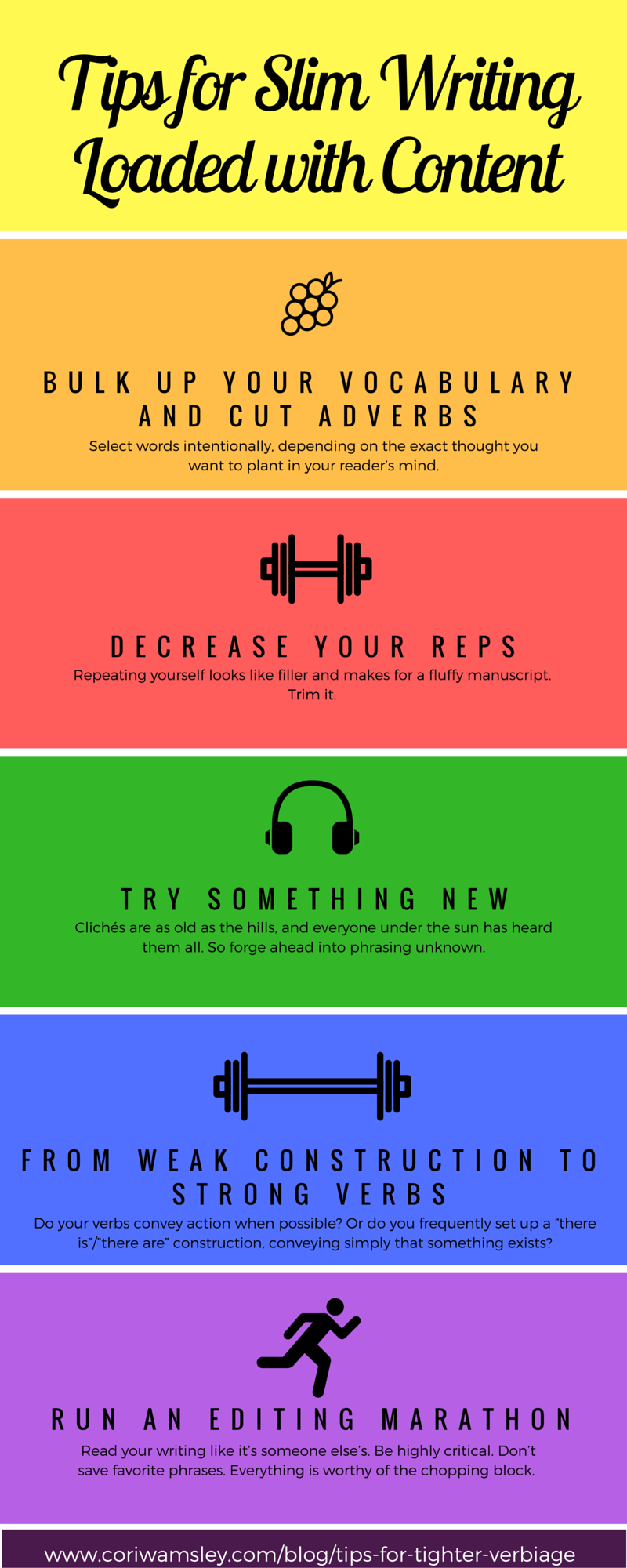Longing for that sleek, tight verbiage and strong content that everyone craves? Look no further!
My tips for writing skinny will help you tone your verbiage for maximum impact at a trimmer word count!
Bulk up your Vocabulary and Cut Adverbs
A good thesaurus and a healthy knowledge of connotation vs. denotation is part of any good writing diet plan.
It’s likely that you learned about synonyms way back in elementary school, but consider any set of synonyms you can think of. Do they truly have identical meanings? Or are they shades different.
You probably have a variety of words in your own vocabulary (without Googling a thesaurus) to talk about items that are large. You know that a store might be big, enormous, or gargantuan, which all mean “large,” and understand the different shades of meaning. But that’s easy.
I recently edited a piece that spoke about inspiring women entrepreneurs, and the person who had written it referred to the ladies as “fantastic.” Though I agree with the writer, I thought we could be more specific. I suggested “ambitious, bold, courageous, tenacious, pioneering, groundbreaking, and innovative.” Though these words are all similar, they have different shades of meaning that would cause you to select one depending on the exact thought you want to plant in your reader’s mind.
Make sure that each word you use is intentional, and your writing will automatically become more vibrant. And this means no more relying on “really,” “very,” “quite,” “extremely” and other adverbs that do the work of more specific adjectives. It’s not “really hard.” It’s “impossible.”
Words like “better” can be swapped out for something more specific as well. What will make it better? Is it “more effective,” “longer lasting,” “faster,” or “cleaner”? Be precise.
Decrease your Reps
As with exercise, when you decrease your reps, you increase weight.
Repeating yourself doesn’t provide quality to your reader. Some people fall into the trap of saying the same thing but with different phrasing as they attempt to stretch to their word count. How does that look to your reader, though? It likely looks like filler and makes for a fluffy manuscript. Trim it.
In a world full of long-lived acronyms, we sometimes forget what they actually stand for. How often have you heard someone say “ATM machine” or “VIN number?” Remember what the last letter of those acronyms stands for? You got it. Avoid this in your writing, and that’s one more spot where you have tightened the verbiage.
Yet another way people repeat themselves—frequently without realizing it—is within a phrase. Saying things like “12 noon,” “the color pink”/”pink in color,” “10 feet long in size,” “total of 30 doughnuts,” “end result,” or “currently, we are.” I could list examples till Halley’s Comet swings by again. This is an easy one. Cut the excess like “in size” or “total of.” The construction of your “we are” sentence indicates “currently,” so remove that, too.
Try Something New
Clichés are as old as the hills, and everyone under the sun has heard them all. If you find yourself using phrasing that is popular—not just for analogies like “cool as a cucumber”—then change it. Here are a few examples that you might not have thought of.
- In this day and age
- Blue moon
- Time and again
- Well aware
- Actions speak louder than words
- Blood is thicker than water
- What goes around comes around
Instead of the tried and true, look into new ways to explain things. Imitation may be the highest form of flattery, but unique phrasing is more likely to captivate your audience.
I had a biology professor in college who used the phrase “rare as hen’s teeth” all the time. I already found her inspiring because she had obtained her PhD in biology at a time when women weren’t supposed to work outside the home, and here she was with nifty catch phrases, as well. As it turns out, this too is a cliche, but I had never heard it, and I always smiled when she said it. It was perfect. While I was in her class, I thought that this was her own special analogy.
So forge ahead into phrasing unknown. You’re bound to come up with something that is a better fit for your writing, based on your experience and field of expertise, than anything we’ve all heard before.
From Weak Construction to Strong Verbs
Look at the verbs you use. Do they have beefy arms and rippling muscles? Do they convey action when possible? Or do you frequently set up a “there is”/”there are” construction, conveying simply that something exists?
Dodge being verbs if you can. Instead of saying “There are more effective ways of conveying your thoughts to your audience,” you could say “Consider more effective ways of conveying your thoughts to your audience.” I want my reader to think about the ways, not just know that they exist. I’m driving them to action.
Another weak construction is phrasing like “try and” or “go and” followed by a second verb. This phrasing began as “try to” and “go to,” but it has changed in some locales. Frequently the “try and” or “go and” can be dropped from the sentence altogether, like “We would like to try and stay till noon.” “We would like to stay till noon” is much crisper.
Run an Editing Marathon
Read your writing like it’s someone else’s. Be highly critical. Don’t save favorite phrases. Everything is worthy of the chopping block.
Check for places to tighten verbiage like removing “in order” from in front of “to” or changing “is addressing” or other verb phrases that start with being verbs to “addresses,” etc.
Your writing is never ready without a thorough, brutal review.
Let’s trim and strengthen that verbiage together!


